Politics
Undervaccinated ethnic minority groups in UK at higher risk of Covid | Coronavirus
People from ethnic minority groups in the UK are twice as likely to be under-vaccinated against Covid-19 compared with individuals who have a white British background.
That is the striking finding of a study carried out by scientists at Health Data Research UK, which indicates that people from these groups are more likely to need hospital treatment or risk death from Covid because they lack full protection against the disease.
“The results are very clear,” said Prof Angela Wood, of the HDR UK and Cambridge University. “Using data for 67 million people from England, Scotland and Wales, we found that only about 40% of those of white backgrounds had not had their full Covid vaccinations by the beginning of this year, while 80% of individuals from some ethnic groups were under-vaccinated. It is a really striking difference.”
Those who had under-vaccination levels of 80% included people from Black African, Black Caribbean and Asian Pakistani backgrounds. Others, including those in Asian Chinese and Asian Indian groups, were about 60% under-vaccinated.
“A person is deemed to be under-vaccinated if they had missed any of the Covid jabs that were recommended for their age group,” Wood told the Observer.
The discovery of the high vulnerability of ethnic groups to Covid comes as the health services prepare for an expected rise in cases with winter approaching. Doctors and pharmacies are already offering jabs to eligible individuals such as residents in care homes and people over 65.
The research on ethnic groups and Covid vaccines is a follow-up to a study published earlier this year in which scientists collaborated to reveal the take-up of Covid vaccines across Britain. This allowed them to identify the proportion of people who were under-vaccinated by the end of 2022 in England (46%), Northern Ireland (50%), Scotland (33%) and Wales (34%).
“We also found that people who are more likely to be under-vaccinated were male, younger and from more deprived backgrounds,” Wood said.
The consequences of the failure to obtain full vaccination were profound, the study showed. An estimated 7,000 severe Covid outcomes, including hospitalisation and death, would have been triggered by the lack of full protection, the group calculated.
The original study – carried out by the HDR UK and Edinburgh University – also indicated that those in ethnic minority groups were also more at risk of being under-vaccinated and it was decided to look more carefully at the issue. So the researchers split the population of England, Scotland and Wales – Northern Ireland figures were not included in the latest study – into 13 different ethnic categories. Apart from the group labelled white British or Irish, which had just over 40% of people under-vaccinated, all other categories had figures over 60%, while several reached 80%. “It is a substantial discrepancy,” said Wood.
after newsletter promotion
The discovery that people in ethnic minority groups are particularly lacking in protection against Covid is a major worry for health officials, although Wood sounded a note of caution. “People in the different ethnic groups have different age profiles … and tend to have fewer old people. We also know, from our first study, that younger people, in general, are less likely to take up the vaccine. So that might be influencing our results. Nevertheless, it is worrying.
“We have been able to calculate these differences using whole-population, electronic health records available for Covid-related research. But there is a public health need to look at vaccinations for other conditions, for example, the take up of measles vaccines for different ethnic groups across the UK. There are a host of similar studies that we now need to look at as a matter of urgency.”
Politics
Just Stop Oil activists banned from London protests by judge
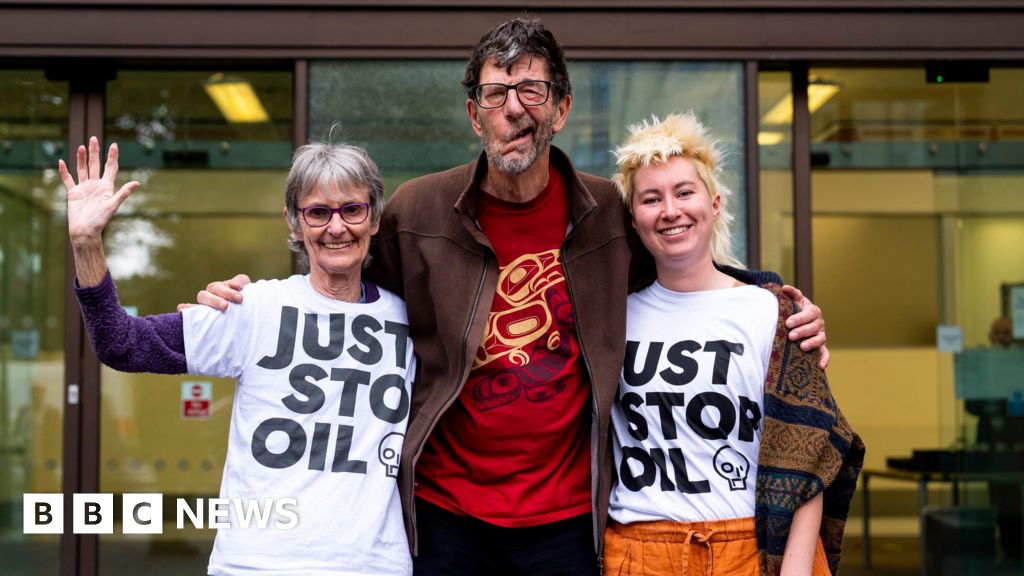
Three Just Stop Oil activists have been banned from protesting in London ahead of their trial for allegedly throwing soup at two Vincent Van Gogh paintings at the National Gallery.
Mary Somerville, 77, Stephen Simpson, 71, and Phillipa Green, 24, are each charged with two counts of damaging the frames of Sunflowers 1889 and Sunflowers 1888 by dousing the artwork in soup.
The three appeared at Southwark Crown Court earlier and pleaded not guilty before being released on conditional bail.
The judge banned them from protest action within the boundary of the M25 until their trial – which is scheduled to begin in January 2026.
Mr Simpson, of Shipley, West Yorkshire, and Ms Somerville, of Bradford, West Yorkshire, attended court in person, while Ms Green, from Penryn in Cornwall, appeared by video link.
Their lawyer, Raj Chada, argued the ban was a “disproportional” infringement on their right to protest because London is “the seat of government”.
But Judge Alexander Milne said: “The application of the defendants’ right to protest is a relative one – and there seems to be a great deal of blurring between the exercise of that right and the commission of criminal offences.
“This court is not banning them from lawful protest anywhere else in the UK, but I will ban them from participating in any protest within the M25.”
Politics
Tommy Robinson jailed for contempt of court

 Julia Quenzler
Julia QuenzlerTommy Robinson has been jailed for 18 months after admitting contempt of court by repeating false claims against a Syrian refugee.
Robinson, whose real name is Stephen Yaxley-Lennon, admitted 10 breaches of a High Court order made in 2021 during a hearing in Woolwich Crown Court.
Lawyers for the solicitor general accused Robinson, 41, of “undermining” the rule of law.
Barristers for Robinson said it was his “principles that have brought him before the court”.
The hearing on Monday was the culmination of events that date back to October 2018.
That month, a video went viral showing how Jamal Hijazi, a Syrian in West Yorkshire, had been attacked by another teenager at school.
Yaxley-Lennon then posted his own response to one million Facebook followers alleging that his investigation had established that Mr Hijazi was a violent thug, a claim that was untrue.
The Yaxley-Lennon video spread widely and the Syrian teenager and his family received death threats.
Three years later, Mr Hijazi won £100,000 in damages when the High Court ruled the Yaxley-Lennon’s claims against him had amounted to defamation.
The court imposed an injunction on Yaxley-Lennon, banning him from making the false claims again.
In February 2023, Yaxley-Lennon began repeating the claims and went on to post online a film claiming he had been “silenced” by the state.
That film may have been viewed at least 47 million times.
Eventually, this July, Yaxley-Lennon showed the film to thousands of his supporters in Trafalgar Square, saying he would not be silenced. The following day he left the country.
Aidan Eardley KC, for the solicitor general, told the court that Yaxley-Lennon had intended to repeat the false allegations, despite the injunction, and then take “evasive” measures.
 PA
PA“This is a high culpability case because of the high number of breaches,” said Mr Eardley.
“It is a continuing breach, the material is still out there and some of it is under the defendant’s control.”
Sasha Wass KC, for Stephen Yaxley-Lennon, said he was a journalist who had been following his principles and was a passionate believer in free speech.
“This defendant has been neither sly nor dishonest nor seeking gain for himself,” she said.
She said that he was such a controversial figure he may be placed in solitary confinement by prison governors, as had occurred the last time he had been jailed, and there was medical evidence he had previously suffered trauma, panic attacks and nightmares.
Jailing Yaxley-Lennon for 18 months, Mr Justice Johnson said: “In a democratic society underpinned by the rule of law, court orders must be obeyed.
“Nobody is above the law. Nobody can pick or choose which laws or which injunctions they obey, or which they do not.
“Even if they believe that an injunction is… contrary to their views they must comply with the injunction.
“They are not entitled to set themselves up as the judge in their own court. Otherwise the administration of justice and rule of law would break down.”
The judge said that the contempt of court had been aggravated because the defendant had repeated the claims after the beginning of proceedings against him – and he had not taken steps to stop the false claims continuing to be in circulation.
The sentence could in future be cut by four months if the defendant showed the court that he had taken steps to remove the offending film.
But the judge added: “The defendant has not shown any inclination to comply with the injunction in the future. All of his actions suggest that he regards himself as above the law.”
This case was the fourth contempt case he has faced, having previously received a suspended sentence and a six-month jail term.
Yaxley-Lennon has been separately charged with failing to unlock his phone for police when he was stopped and questioned at a port under counter-terrorism powers. He will next appear in court in relation to that allegation in November.
Politics
Bus fares cap in England to be raised to £3
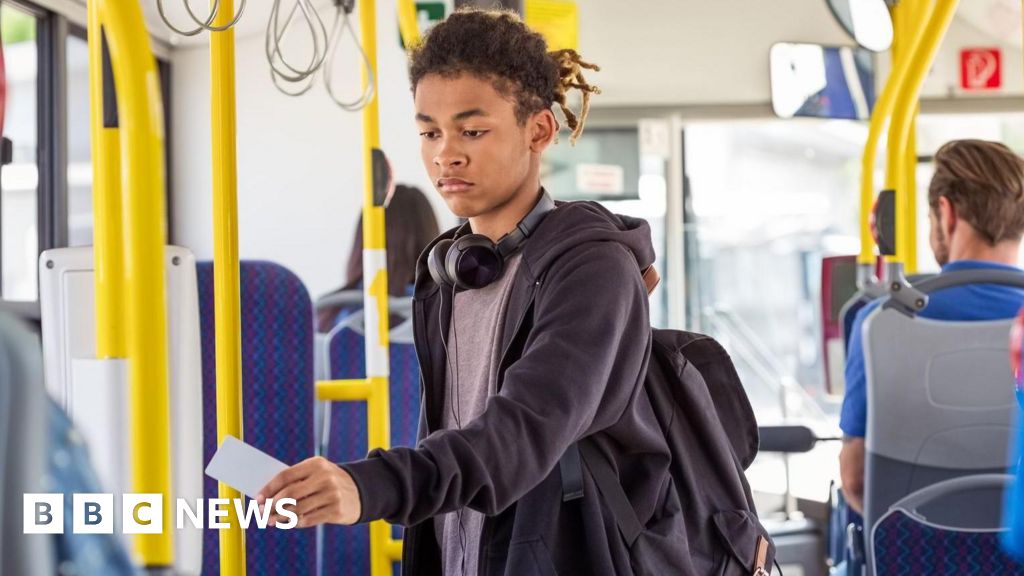
The bus fare cap in England will be raised to £3 in the upcoming Budget, Prime Minister Sir Keir Starmer has announced.
It is an increase on the current limit of £2 which was introduced under the previous Conservative government to help with the cost of living.
The existing cap was due to expire at the end of December.
Sir Keir said: “I do know how much this matters, particularly in rural communities where there is heavy reliance on buses.”
The new £3 cap will run until the end of 2025.
There had been speculation in recent days that the chancellor would announce in the Budget on Wednesday that the current cap would be scrapped.
This would have meant that some passengers faced a steep hike in fares following two years of help.
Around 3.4 million people in England use buses. The Confederation of Passenger Transport said raising the cap from £2 has avoided travellers facing a “cliff edge” at the end of this year.
But it said: “An increase to £3 will still present challenges for many passengers, particularly those who rely on buses as their primary means of affordable travel.”
Greenpeace said it was a “‘tough decision’ the government didn’t need to make”.
“It makes no political, economical or environmental sense whatsoever,” said Paul Morozzo, Greenpeace’s UK’s senior transport campaigner.
He said buses are a “critical lifeline to millions of people, particularly those on lower incomes”.
“A government that was truly prioritising the needs of the poorest in society would rethink this decision at the first opportunity,” he said.
Politics
PM ‘shocked’ by CCTV appearing to show Mike Amesbury MP punch man

The Prime Minister has said video footage that has emerged of MP Mike Amesbury appearing to punch a man to the ground is “shocking”.
Mr Amesbury has been suspended from the party and had the Labour whip withdrawn after CCTV footage appeared on Sunday.
Sir Keir Starmer said the party had “moved very swiftly” to respond after the footage was published.
He added: “There is now a police investigation and in the circumstances you’ll appreciate there’s not much more I can say about that.”
Cheshire Police said a 55-year-old man had been voluntarily interviewed under caution in relation to the incident and had since been released pending further enquiries.
In footage obtained by the Daily Mail, the Runcorn and Helsby MP is apparently seen continuing to hit the man as he lies in the street.
Amesbury has been contacted for comment.
A different video, posted on X, purported to show Amesbury shouting and swearing at the man lying in the street in Frodsham, Cheshire.
Politics
How UK is preparing for new US president

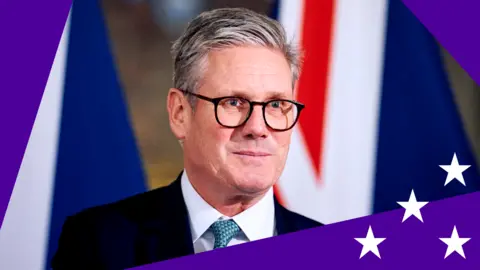 Reuters
Reuters“To everyone’s astonishment, the vulgar insurgent has won!”
So wrote a British foreign minister in his diaries on 9 November 2016 after Donald Trump unexpectedly beat Hillary Clinton to the White House.
“This looked remarkably like an abuse of power.”
So wrote the then prime minister in her memoirs after waking up to realise that a Trump-led Washington had said US troops would be pulled out of the fight against the Islamic State group in Iraq and Syria “without any reference to the UK and other nations whose troops were operating alongside them”.
Sir Alan Duncan and Theresa May are the authors of these remarks which the present prime minister, Sir Keir Starmer, would do well to note as he ponders what difference a Trump or Kamala Harris presidency could make to the so-called special relationship between the UK and the US.
“Dealing with Donald Trump and his administration was like dealing with no other world leader,” writes the now Lady May in her book reflecting on her career.
“He was an American president like no other.”
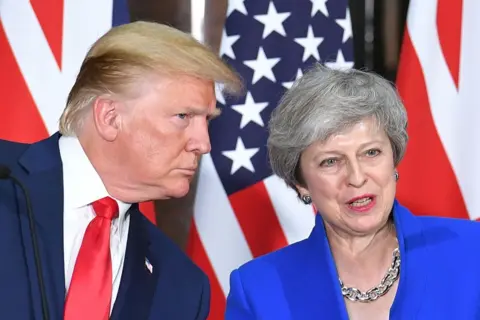 AFP
AFPThere will be challenges, too, if the Democratic vice-president wins. She has yet to meet Sir Keir and has shown limited affinity for Europe – but she will be a vastly more conventional president than her rival.
On the off-chance that Sir Keir thought things might be different this time if Trump wins next week, the last few days showed him otherwise.
The accusation of election interference made by the Trump campaign, courtesy of an, at best, foolishly written LinkedIn post blew up into a transatlantic spat.
“This needs to be seen for what it is. It’s happened every election, every political party does it,” Sir Keir told me, in reference to people volunteering to work for one side or the other in American elections.
But the difference was obvious. On previous occasions it hasn’t caused an almighty row.
It was a reminder that Team Trump can be brash, unpredictable and have a long memory for perceived slights – and don’t appear to really give a stuff about their relationship with the British government.
What on earth might happen to the UK’s most cherished overseas partnership if he wins?
Until the row in the past week, things had, on the face of it, been going well for the new prime minister and US relations.
A few weeks ago Sir Keir and Foreign Secretary David Lammy were in New York to meet the former president, with me accompanying them.
Teetering on a pavement on Fifth Avenue with the 58-storey Trump Tower behind me, we were trying to perfect the angle for broadcast so the garish gold lettering spelling out “TRUMP TOWER” was visible to viewers, even if a giant lorry barrelled down the road as I started talking.
I think we managed it. But a similar balancing act faced the two men – they were in New York for the United Nations General Assembly but much of the chat on the trip was not about them meeting one of the world leaders present but whether they could get time with a candidate hoping to become one, Donald Trump.
And they did get that meeting – which tells you rather a lot about the work British diplomats in America and London have been putting in and the determination of Sir Keir and Mr Lammy to build bridges with the man who may be president again before long.
The prime minister later told me on BBC’s Newscast that “we both wanted to ensure we have a good relationship”.
“It’s up to me as prime minister to make sure I have a good relationship with whoever the president is,” he said.
“I believe strongly in personal relations. Have the ability to, as necessary, pick up the phone to them to sort out issues or talk about issues. So it was a good dinner and I’m really glad that we managed to do it.”
Glad, no doubt at least in part, because of the buckets full of disobliging quotes there are about Trump, not least from David Lammy, who once described his host as a “woman-hating, neo-Nazi-sympathising sociopath” and a “tyrant in a toupee”.
There are no shortage of verbal skeletons in Labour’s cupboard about the man who could soon be back in the Oval Office.
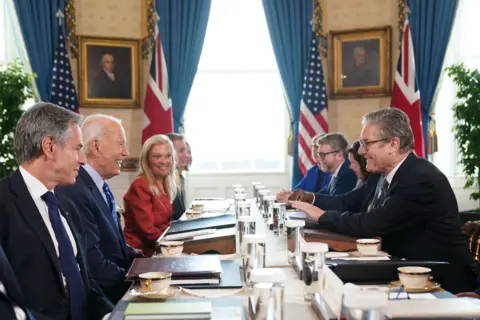 PA
PAIn policy terms, a Trump presidency would likely bring rapid change – on climate change, on international trade (whacking up import taxes, tariffs) and on Ukraine.
Unlike a Harris administration, they would likely offer the UK a free trade deal, but it seems unlikely the terms of it would tempt London to sign up.
So what of Trump’s Democratic rival, the vice-president Kamala Harris?
Diplomatic niceties suggest if you meet one candidate in a foreign election contest, you meet the other one too.
But that isn’t likely to happen with Harris, despite Sir Keir visiting America three times since July.
No 10 blames the pressures on the vice-president’s diary in an election campaign.

It is worth stating the obvious too – while Sir Keir and Harris have never met, she is a vastly more known quantity and far more likely to be conventional in her approach to high office than her rival.
And Sir Keir has gone out of his way to spend a lot of time with President Biden in the last four months, including two trips to the White House and a recent meeting in Berlin.
An imperfect way of getting a sense of how his vice-president might govern – and with no opportunity to build a personal relationship – but not entirely useless at getting something of a handle on it.
Oh and it is worth making a very big picture point too – whoever wins. Increasingly, America’s focus is on the rise of the east and in particular China. Europe matters less to Washington than it did and that holds true whatever the result.
And so Westminster and the world awaits.
Whatever happens, expect the conversation to quickly turn to if and when the prime minister gets an early invite to Washington in the new year.
There will be a queue of leaders heading to the White House.
And what about a state visit to the UK – as Donald Trump revelled in, in 2019 – for a returning president like no other or for America’s first woman president?
Let’s see.

Between now and the US election on 5 November, BBC correspondents around the world are exploring the impact its outcome could have where they are, and what people around the globe make of this White House race.
Politics
Working people know who they are
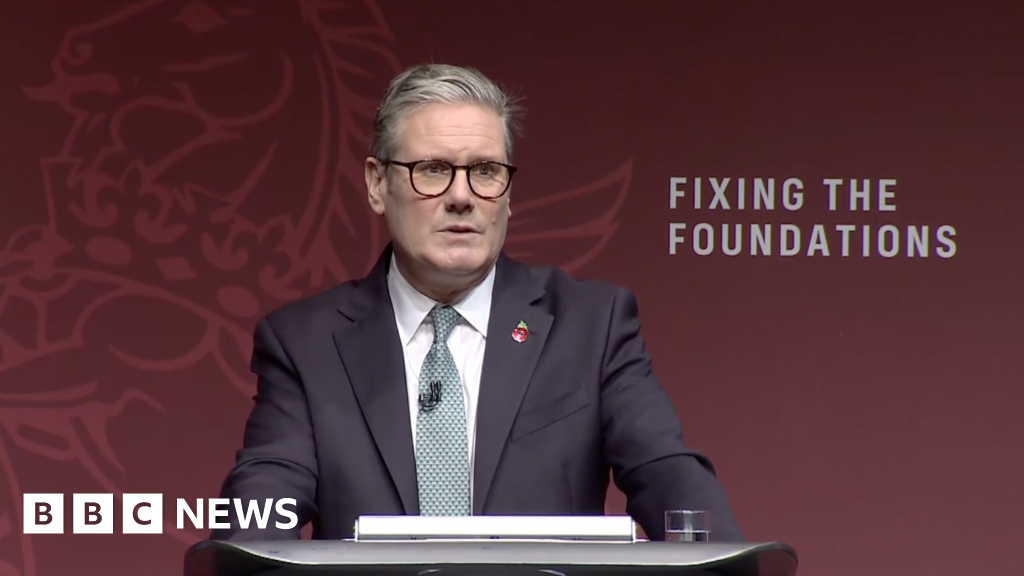
The prime minister says “working people know exactly who they are” in a speech ahead of the Budget.
Speaking in the West Midlands, Sir Keir Starmer stressed that working people are the “golden thread” that runs through his government’s agenda.
On Wednesday, Chancellor Rachel Reeves will deliver Labour’s first Budget for 14 years.
-

 Technology1 month ago
Technology1 month agoIs sharing your smartphone PIN part of a healthy relationship?
-

 Science & Environment1 month ago
Science & Environment1 month agoHow to unsnarl a tangle of threads, according to physics
-

 Science & Environment1 month ago
Science & Environment1 month agoHyperelastic gel is one of the stretchiest materials known to science
-

 Science & Environment1 month ago
Science & Environment1 month ago‘Running of the bulls’ festival crowds move like charged particles
-

 Science & Environment1 month ago
Science & Environment1 month agoMaxwell’s demon charges quantum batteries inside of a quantum computer
-

 Technology1 month ago
Technology1 month agoWould-be reality TV contestants ‘not looking real’
-

 Science & Environment1 month ago
Science & Environment1 month agoX-rays reveal half-billion-year-old insect ancestor
-

 Science & Environment1 month ago
Science & Environment1 month agoSunlight-trapping device can generate temperatures over 1000°C
-

 Technology4 weeks ago
Technology4 weeks agoUkraine is using AI to manage the removal of Russian landmines
-

 Science & Environment1 month ago
Science & Environment1 month agoLiquid crystals could improve quantum communication devices
-

 Science & Environment1 month ago
Science & Environment1 month agoPhysicists have worked out how to melt any material
-

 Science & Environment1 month ago
Science & Environment1 month agoQuantum ‘supersolid’ matter stirred using magnets
-

 TV4 weeks ago
TV4 weeks agoসারাদেশে দিনব্যাপী বৃষ্টির পূর্বাভাস; সমুদ্রবন্দরে ৩ নম্বর সংকেত | Weather Today | Jamuna TV
-

 Technology3 weeks ago
Technology3 weeks agoSamsung Passkeys will work with Samsung’s smart home devices
-

 Sport4 weeks ago
Sport4 weeks agoBoxing: World champion Nick Ball set for Liverpool homecoming against Ronny Rios
-

 Science & Environment1 month ago
Science & Environment1 month agoLaser helps turn an electron into a coil of mass and charge
-

 Football4 weeks ago
Football4 weeks agoRangers & Celtic ready for first SWPL derby showdown
-

 News3 weeks ago
News3 weeks agoMassive blasts in Beirut after renewed Israeli air strikes
-

 Science & Environment1 month ago
Science & Environment1 month agoA new kind of experiment at the Large Hadron Collider could unravel quantum reality
-

 Technology4 weeks ago
Technology4 weeks agoGmail gets redesigned summary cards with more data & features
-

 News4 weeks ago
News4 weeks ago‘Blacks for Trump’ and Pennsylvania progressives play for undecided voters
-

 Sport3 weeks ago
Sport3 weeks agoAaron Ramsdale: Southampton goalkeeper left Arsenal for more game time
-

 News3 weeks ago
News3 weeks ago▶ Hamas Spent $1B on Tunnels Instead of Investing in a Future for Gaza’s People
-

 News3 weeks ago
News3 weeks agoNavigating the News Void: Opportunities for Revitalization
-

 MMA3 weeks ago
MMA3 weeks ago‘Uncrowned queen’ Kayla Harrison tastes blood, wants UFC title run
-

 MMA4 weeks ago
MMA4 weeks agoDana White’s Contender Series 74 recap, analysis, winner grades
-

 MMA4 weeks ago
MMA4 weeks agoPereira vs. Rountree prediction: Champ chases legend status
-

 Business3 weeks ago
Business3 weeks agoWhen to tip and when not to tip
-

 Technology1 month ago
Technology1 month agoRussia is building ground-based kamikaze robots out of old hoverboards
-

 Football4 weeks ago
Football4 weeks agoWhy does Prince William support Aston Villa?
-

 Technology4 weeks ago
Technology4 weeks agoMicrophone made of atom-thick graphene could be used in smartphones
-

 Womens Workouts1 month ago
Womens Workouts1 month ago3 Day Full Body Women’s Dumbbell Only Workout
-

 Technology4 weeks ago
Technology4 weeks agoMusk faces SEC questions over X takeover
-

 Sport3 weeks ago
Sport3 weeks agoWales fall to second loss of WXV against Italy
-

 Money3 weeks ago
Money3 weeks agoWetherspoons issues update on closures – see the full list of five still at risk and 26 gone for good
-

 Sport3 weeks ago
Sport3 weeks agoMan City ask for Premier League season to be DELAYED as Pep Guardiola escalates fixture pile-up row
-

 Science & Environment1 month ago
Science & Environment1 month agoWhy this is a golden age for life to thrive across the universe
-

 Science & Environment1 month ago
Science & Environment1 month agoQuantum forces used to automatically assemble tiny device
-

 Science & Environment1 month ago
Science & Environment1 month agoA slight curve helps rocks make the biggest splash
-

 Science & Environment1 month ago
Science & Environment1 month agoNuclear fusion experiment overcomes two key operating hurdles
-

 Technology4 weeks ago
Technology4 weeks agoEpic Games CEO Tim Sweeney renews blast at ‘gatekeeper’ platform owners
-
Business4 weeks ago
DoJ accuses Donald Trump of ‘private criminal effort’ to overturn 2020 election
-

 News4 weeks ago
News4 weeks agoWoman who died of cancer ‘was misdiagnosed on phone call with GP’
-

 Technology4 weeks ago
Technology4 weeks agoMicrosoft just dropped Drasi, and it could change how we handle big data
-

 MMA3 weeks ago
MMA3 weeks agoKetlen Vieira vs. Kayla Harrison pick, start time, odds: UFC 307
-

 Sport3 weeks ago
Sport3 weeks ago2024 ICC Women’s T20 World Cup: Pakistan beat Sri Lanka
-

 Science & Environment1 month ago
Science & Environment1 month agoITER: Is the world’s biggest fusion experiment dead after new delay to 2035?
-

 News1 month ago
News1 month ago▶️ Hamas in the West Bank: Rising Support and Deadly Attacks You Might Not Know About
-

 Technology1 month ago
Technology1 month agoMeta has a major opportunity to win the AI hardware race
-

 Technology1 month ago
Technology1 month agoWhy Machines Learn: A clever primer makes sense of what makes AI possible
-

 Sport4 weeks ago
Sport4 weeks agoChina Open: Carlos Alcaraz recovers to beat Jannik Sinner in dramatic final
-

 Sport4 weeks ago
Sport4 weeks agoSturm Graz: How Austrians ended Red Bull’s title dominance
-

 MMA3 weeks ago
MMA3 weeks ago‘I was fighting on automatic pilot’ at UFC 306
-

 Entertainment3 weeks ago
Entertainment3 weeks agoNew documentary explores actor Christopher Reeve’s life and legacy
-

 News4 weeks ago
News4 weeks agoRwanda restricts funeral sizes following outbreak
-

 Technology4 weeks ago
Technology4 weeks agoThis AI video generator can melt, crush, blow up, or turn anything into cake
-
Business4 weeks ago
Sterling slides after Bailey says BoE could be ‘a bit more aggressive’ on rates
-

 News4 weeks ago
News4 weeks agoCornell is about to deport a student over Palestine activism
-

 News3 weeks ago
News3 weeks agoFamily plans to honor hurricane victim using logs from fallen tree that killed him
-

 Technology3 weeks ago
Technology3 weeks agoThe best budget robot vacuums for 2024
-

 Sport3 weeks ago
Sport3 weeks agoCoco Gauff stages superb comeback to reach China Open final
-

 Science & Environment1 month ago
Science & Environment1 month agoNerve fibres in the brain could generate quantum entanglement
-

 Science & Environment1 month ago
Science & Environment1 month agoTime travel sci-fi novel is a rip-roaringly good thought experiment
-

 Science & Environment1 month ago
Science & Environment1 month agoHow to wrap your mind around the real multiverse
-

 MMA4 weeks ago
MMA4 weeks agoJulianna Peña trashes Raquel Pennington’s behavior as champ
-

 News4 weeks ago
News4 weeks agoGerman Car Company Declares Bankruptcy – 200 Employees Lose Their Jobs
-

 Technology4 weeks ago
Technology4 weeks agoTexas is suing TikTok for allegedly violating its new child privacy law
-

 Technology3 weeks ago
Technology3 weeks agoCheck, Remote, and Gusto discuss the future of work at Disrupt 2024
-

 News3 weeks ago
News3 weeks agoHull KR 10-8 Warrington Wolves – Robins reach first Super League Grand Final
-
Business3 weeks ago
The search for Japan’s ‘lost’ art
-

 Business4 weeks ago
Business4 weeks agoStocks Tumble in Japan After Party’s Election of New Prime Minister
-
Business4 weeks ago
Bank of England warns of ‘future stress’ from hedge fund bets against US Treasuries
-

 Business4 weeks ago
Business4 weeks agoChancellor Rachel Reeves says she needs to raise £20bn. How might she do it?
-

 MMA4 weeks ago
MMA4 weeks agoKayla Harrison gets involved in nasty war of words with Julianna Pena and Ketlen Vieira
-

 Health & fitness4 weeks ago
Health & fitness4 weeks agoNHS surgeon who couldn’t find his scalpel cut patient’s chest open with the penknife he used to slice up his lunch
-

 Technology3 weeks ago
Technology3 weeks agoThe best shows on Max (formerly HBO Max) right now
-

 Technology3 weeks ago
Technology3 weeks agoIf you’ve ever considered smart glasses, this Amazon deal is for you
-

 News1 month ago
News1 month ago▶️ Media Bias: How They Spin Attack on Hezbollah and Ignore the Reality
-

 Sport4 weeks ago
Sport4 weeks agoWorld’s sexiest referee Claudia Romani shows off incredible figure in animal print bikini on South Beach
-
Business4 weeks ago
how UniCredit built its Commerzbank stake
-

 Football4 weeks ago
Football4 weeks agoSimo Valakari: New St Johnstone boss says Scotland special in his heart
-

 Technology4 weeks ago
Technology4 weeks agoJ.B. Hunt and UP.Labs launch venture lab to build logistics startups
-
Politics4 weeks ago
Rosie Duffield’s savage departure raises difficult questions for Keir Starmer. He’d be foolish to ignore them | Gaby Hinsliff
-

 MMA3 weeks ago
MMA3 weeks agoUFC 307 preview show: Will Alex Pereira’s wild ride continue, or does Khalil Rountree shock the world?
-
Business3 weeks ago
Head of UK Competition Appeal Tribunal to step down after rebuke for serious misconduct
-

 Business3 weeks ago
Business3 weeks agoStark difference in UK and Ireland’s budgets
-

 MMA3 weeks ago
MMA3 weeks agoPereira vs. Rountree preview show live stream
-

 MMA3 weeks ago
MMA3 weeks ago‘Dirt decision’: Conor McGregor, pros react to Jose Aldo’s razor-thin loss at UFC 307
-

 Science & Environment4 weeks ago
Science & Environment4 weeks agoMarkets watch for dangers of further escalation
-

 Technology4 weeks ago
Technology4 weeks agoAmazon’s Ring just doubled the price of its alarm monitoring service for grandfathered customers
-

 Technology3 weeks ago
Technology3 weeks agoApple iPhone 16 Plus vs Samsung Galaxy S24+
-

 Technology3 weeks ago
Technology3 weeks agoOpenAI secured more billions, but there’s still capital left for other startups
-

 Money3 weeks ago
Money3 weeks agoPub selling Britain’s ‘CHEAPEST’ pints for just £2.60 – but you’ll have to follow super-strict rules to get in
-

 Sport4 weeks ago
Sport4 weeks agoPremiership Women’s Rugby: Exeter Chiefs boss unhappy with WXV clash
-

 News1 month ago
News1 month agoOur millionaire neighbour blocks us from using public footpath & screams at us in street.. it’s like living in a WARZONE – WordupNews
-

 MMA4 weeks ago
MMA4 weeks agoAlex Pereira faces ‘trap game’ vs. Khalil Rountree
-

 News4 weeks ago
News4 weeks agoLiverpool secure win over Bologna on a night that shows this format might work
-

 Money3 weeks ago
Money3 weeks agoAll the key dates for Christmas to save you money including £4 chocs and 25% off Disney
-

 Technology3 weeks ago
Technology3 weeks agoLG C4 OLED smart TVs hit record-low prices ahead of Prime Day
-

 TV3 weeks ago
TV3 weeks agoLove Island star sparks feud rumours as one Islander is missing from glam girls’ night


You must be logged in to post a comment Login